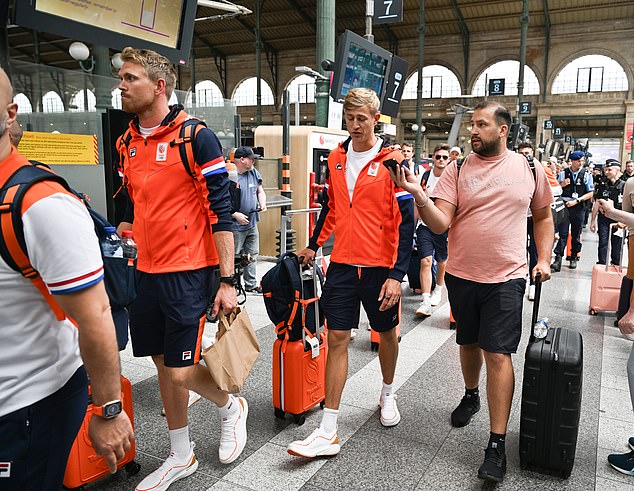The undercover thugs waiting on Platform Nine were the first sign that a storm was brewing. Eight burly men, one of them wearing an LA Lakers basketball jersey, ready for Steven van de Velde’s arrival at Gare du Nord.
After boarding the Eurostar at Rotterdam Centraal, the beach volleyball player was due to set foot in Paris at 2:43 p.m. in a carriage reserved for the Dutch Olympic team.
As the train approached, the police presence increased. The gendarmerie arrived in groups of four, most carrying heavy weapons, in anticipation of an angry reception for the most controversial competitor of these Games.
Three platforms away, the British team’s athletes were escorted away without further problems. But the British team is not taking an athlete who pleaded guilty to three charges of raping a 12-year-old British girl in Milton Keynes in 2014 and was sentenced to four years in prison.
As he disembarked, Van de Velde, 29, did not go unnoticed. He was a 1.98m man dressed in the team’s orange colours and towered over the usual passengers. As he passed through the police gangway, Mail Sport asked him if he was surprised to be selected for these Games. Silence.
Mail Sport’s Nik Simon (right) confronted Steven van de Velde upon his arrival at Paris’ Gare du Nord.
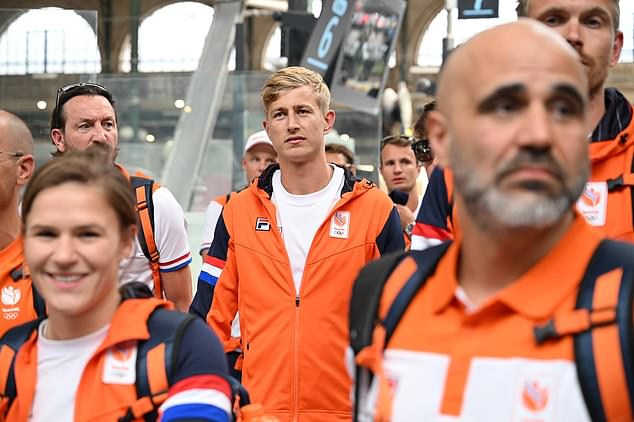
The 29-year-old was sentenced to four years in prison for the rape of a 12-year-old girl in 2014.
What message does your choice send to victims of sexual abuse? Silence.
He just looked towards the station exit, where the team transport was waiting for him. Will he speak to the media about the situation? “I think you can read the statement,” he finally said. “I’m not going to do any interviews with the media.”
And what about your decision not to go to the Olympic Village? “You can read the statement. It has all the information.”
At that point, a member of the Dutch backroom staff stepped between us and blocked the line of communication. “We just arrived,” he said. “We don’t do interviews at the moment.”
Moments later, the team was whisked away to their accommodation in official vehicles. Most of them were stationed at the Olympic Village, where athletes sat in the sun on Tuesday, exchanging team badges with competitors from other countries. It looked like an international carnival, but Van de Velde was not there, at his own request. He checked into his own accommodation on the other side of town, away from prying eyes.
Several athletes are known to have expressed to their committees their deep discomfort that such a criminal is allowed to compete at Paris 2024.
Van de Velde contacted his victim via Facebook and travelled from the Netherlands to meet her. Authorities were alerted after she went to a family planning clinic to obtain a morning-after pill, stressing her age of 12.
Sport has a tendency to embrace individuals who have stepped out of line and returned as reformed characters, but Van de Velde’s actions have no place in such a story.
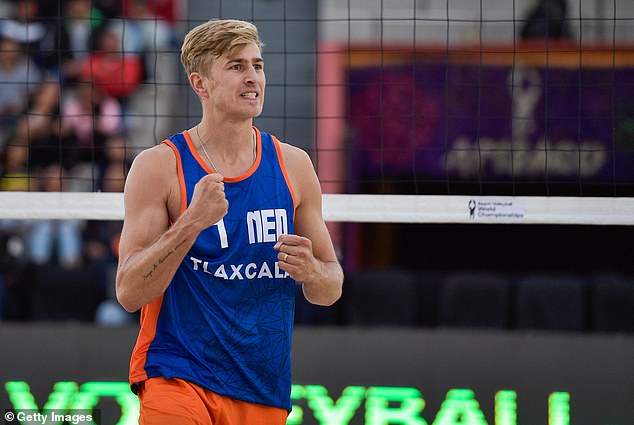
His participation in the Games has sparked outrage among fans and many fellow athletes.
“How on earth has he been allowed to compete?” one athlete told Mail Sport privately. He was tried at Aylesbury Crown Court in 2016 and sentenced to four years in prison for the rapes that occurred two years earlier when he was 19.
He served part of his sentence in the UK before being transferred to the Netherlands, where the law on sexual relations with minors is less strict. It was claimed to be a loving and consensual relationship and was viewed more leniently, and Van de Velde insisted he was not a paedophile after being granted early release.
He remains on the UK sex offenders’ register and on Tuesday the Dutch team referred any questions about his selection to a press release on its website. It said: “We are implementing concrete measures to ensure a safe sporting environment for all Olympic participants following Steven van de Velde’s participation in the Olympic Games.
‘The measures have been drawn up following a thorough risk assessment, taking into account all affected groups. The findings of the assessment have reinforced confidence in the safety of all parties involved.
‘In 2018, beach volleyball player Steven van de Velde returned to international elite sport following a previous conviction for a sexual offence in 2014 in the United Kingdom. His return was made possible following a specialised treatment programme and in accordance with the conditions set by (the Dutch Olympic Committee) for athletes convicted of a criminal offence.
‘Van de Velde has fully complied with all requirements and has met all strict risk assessment, controls and due diligence thresholds. Experts have stated that there is no risk of re-offending.
‘Van de Velde has always been transparent about the case, which he refers to as the biggest misstep of his life. He deeply regrets the consequences his actions have had for those involved and has spoken openly about the personal transformation he has experienced as a result.’
Van de Velde’s silence in the media has meant that other athletes have had to answer questions about their actions in the opening days of these Games. Volleyball teammate Matthew Immers has had to limit comments on many of his Instagram posts to avoid negative reactions.
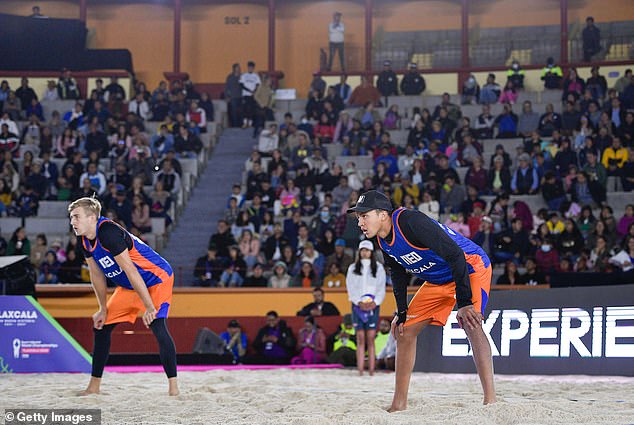
His teammate Matthew Immers (right) came to Van de Velde’s defence, saying it was disgraceful the way people talk about him.
Immers said on Tuesday: “It’s a shame that people talk about him like that. I know the Steven of today and I’m happy about that. He’s a very good teammate for me. We have fun and have good company on and off the pitch, that’s the most important thing for me.”
The Australians have said they would not have considered such a player for their national team. On Tuesday, the Americans spoke of the festive atmosphere that prevails in beach volleyball. Youngster Miles Partain from California praised his “respectful” Swedish rivals, whom he “admires” and who are “good representatives of our sport.”
But when asked about the Dutchman, he said: “We’ve played against them twice and lost twice, so yes. We’re focused on playing as well as possible.”
The inclusion of Van de Velde, who is married to a German volleyball player with whom he has a son, has sparked anger among groups that advocate against sexual abuse and child safety.
Ciara Bergman, chief executive of Rape Crisis England & Wales, said: ‘The fact that convicted rapists can serve a sentence or complete a course of psychotherapy and then return to their careers demonstrates a failure to centre survivors in our response to rape.
‘Survivors must find ways to cope with a range of (usually) lifelong impacts, including trauma, flashbacks, poor physical and mental health and lack of access to proportionate justice.
‘And yet convicted rapists who have high-profile professional careers are allowed to resume them, often using their status as a way to somehow mitigate their crimes.
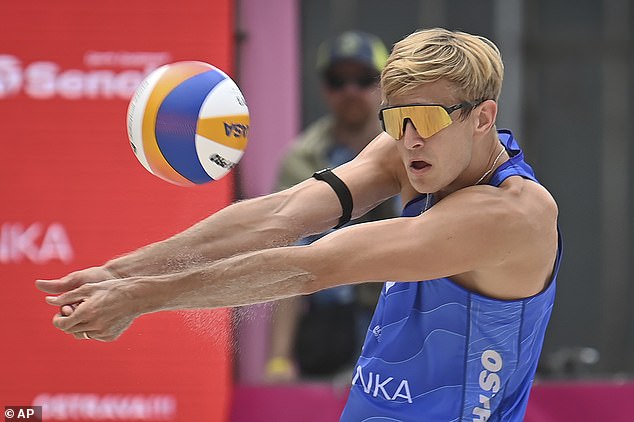
Dutch team boss Pieter van den Hoogenband said on Tuesday evening that he was “surprised by the fuss”.
‘This sends a damaging message: competing in sports is more important than raping a child, and that whenever a perpetrator of sexual violence has “moved on” from his or her behavior, the victim and the rest of us should, too.’
Dutch team boss Pieter van den Hoogenband said on Tuesday evening that he was “surprised by the fuss”.
Beach volleyball should be a joyous event in the shadow of the Eiffel Tower. Instead, it will be played in the shadow of one man’s dark past.


